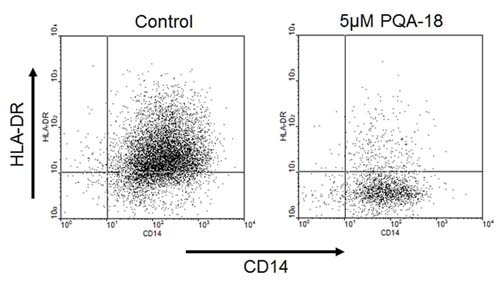PQA-18, a Novel Immunosuppressant, Suppresses Macrophage Differentiation and Macrophage-Mediated Xenogeneic Cytotoxicity
Peichi Lo1, Akira Maeda1, Rieko Sakai1, Chihiro Takakura1, Rei Matsuura1, Tasuku Kodama1, Shohei Hiwatashi1, Hiroshi Eguchi1, Hiroomi Okuyama1, Shuji Miyagawa1.
1Deprtment of Surgery, Osaka University Graduate School of Medicine, Suita, Japan
Introduction: A number of studies have confirmed that innate cellular immunity has a major role in xenograft rejection. Innate cellular rejection by NK cells, macrophages and neutrophils has been reported to cause severe rejection in xenotransplantation. However, nearly all of the currently used immunosuppressive drugs focus on acquired immunity. Therefore, the development of a new immunosuppressive drug to prevent innate immunity would be highly desirable. Prenylated quinolinecarboxylic acid (PQA) -18, a unique PAK-2 inhibitor, was recently reported to have an immunosuppressive function in vivo and in vitro. In this study, we focused on the effect of this new immunosuppressant on macrophages.
Materials and Methods: To evaluate the effect of PQA-18 in xenogeneic macrophage-mediated cytotoxicity, swine endothelial cells (SEC) were co-cultured with PMA-treated THP-1 (a human monocyte-like cell line) in the presence or absence of 5μM PQA-18. The cytotoxicity of THP-1 to SEC was measured by means of a WST-8 assay. PQA-18 was found to significantly suppress THP-1 induced cytotoxicity. Furthermore, we assayed the effect of PQA-18 on macrophage differentiation. Peripheral blood monocytes were obtained by density gradient centrifugation. Peripheral blood monocytes were cultured with 100ng/ml GM-CSF in the presence or absence of PQA-18 and their differentiation into macrophages was assessed by flow cytometry.
Results: Fiestly, we confirmed that 5μM PQA-18 have no cytotoxicity against SEC and THP-1 by fluorescence staining of propidium iodide and annexinV.
PQA-18 demonstrated a significant suppression of THP-1-induced cytotoxicity against SEC in a WST-8 assay (%Cytotoxicity. Control: 37.1±10.4%, 5μM PQA-18: 25.1±6.6%).
In addition, PQA-18 completely suppressed the differentiation of monocytes into macrophages. While a significant upregulation of HLA-DR expression was observed in GM-CSF generated macrophages, macrophages which were generated in the presence of PQA-18 did not express HLA-DR (Figure 1).
Conclusion: These findings suggest that PQA-18 suppress macrophage-mediated xenogeneic rejection and that PQA-18 have the potential to suppress antigen presentation by macrophages. Furthermore, our data indicate that the PAK-2 signaling pathway play an essential role in macrophage differentiation. PQA-18 will be useful in the development of novel immunosuppressive strategies not only in xenotransplantation but also in allogeneic transplantation.
